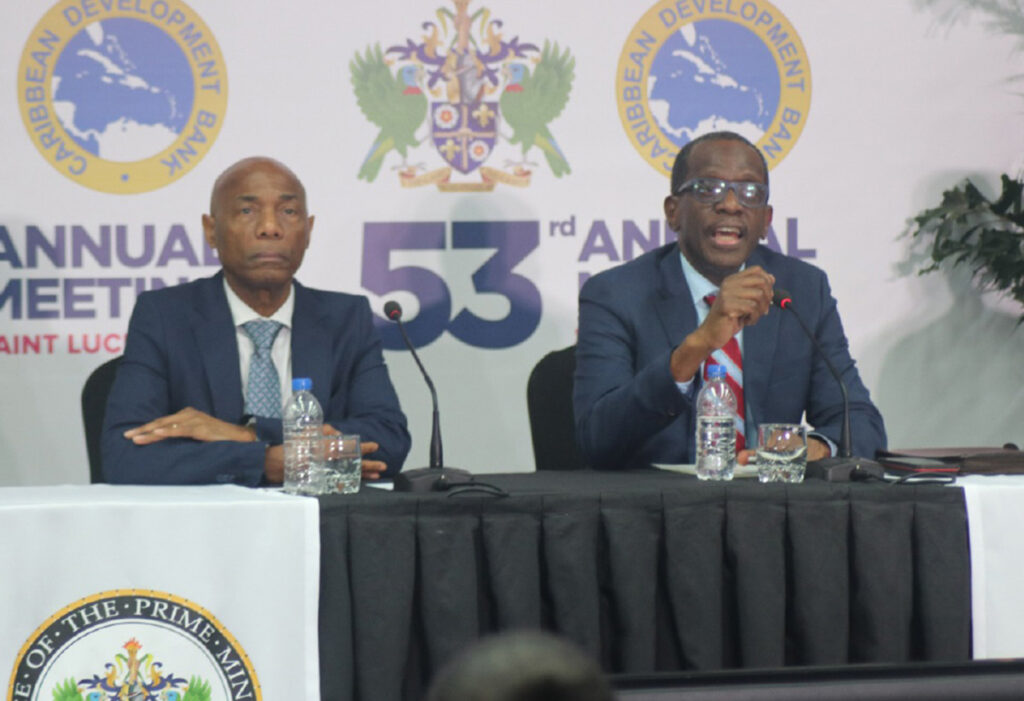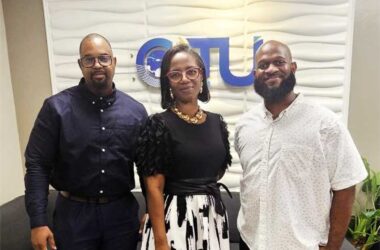President of the Caribbean Development Bank (CDB), Dr. Hyginus “Gene” Leon says that for the wider regional grouping to undertake the challenges of development citizens need to elevate their welfare status in order to sustain livelihoods.
As a prelude to Saint Lucia’s hosting of the 53rd Annual Meeting of the CDB’s Board of Governors, a media forum held yesterday (Tuesday), outlined the mechanisms in place to help bring about greater correlation between public and private sector business enterprise.

Dr. Leon admitted that the region on a whole has not made sufficient progress in the wider developmental sphere. He emphasized that the annual meeting aims to promote the region in a wider global space. He acknowledged the input of Sir Arthur Lewis as- the father of the CDB – and a pioneer of the “development space that we inherited”.
“I think it is an opportune time for us to reimagine, reposition where we are as a region and what we intend to do,” noted the CDB chairman.
“Let’s imagine a region where everyone cannot be rich …but let’s imagine sustainable livelihoods, sustainable in a sense of being able to have everything you want , and being able to enjoy a certain level of welfare that you can identify as being there,” declared Dr. Leon.
He further stressed that regional economies must be resilient to withstand shocks, whenever they occur, be it climate or external and that they have the ability to “bounce back”.
Speaking on the need for more connectivity within the region, Dr. Leon noted: “Connected in physical, connected in digital, connected in cultural space that we can genuinely say we are one.”
He said should peoples of the region share that basic sense of purpose, “we can start thinking …of a region that can be at the forefront of innovation, that can lead and drive the way forward for an entire people and maybe lead the world in that particular space.”
In pursuit of that ‘shared vision’, Dr. Leon listed some key factors that will sustain this journey, as “we map or chart a course for the region.”
He outlined the need to be able to have investment activities “that can meet goals and address our challenges.” Another factor deals with the ‘Industrialization of Knowledge’, “as a means of creating a warehouse, a bank of investment opportunities that can be translated into investment activities that can meet the purpose of solving our challenges.”
Dr. Leon spoke of six major challenges towards a productive and progressive region, to include; food security, water security from potable to sanitation, to waste management, energy security “as necessary and critical”, shelter security, and health security.
“If you can just think of those six goals as meeting the challenges of development that we have, we can begin to think of development as a people issue,” Dr. Leon added. “Where we can focus on elevating the level of welfare …to sustainable livelihoods.”
Noting that such a task cannot be left solely to the employ of governments, the CDB chairman asserted that, “We now need a new model of partnership for development, between the public and the private sectors that can work together to address those goals …and to get us to addressing and achieving and overcoming the challenges that we talk about.”
He said other major challenges would entail, accessing adequate and affordable finance and the issue of implementatioPrime Minister Phillip Pierre and current Chairman of the CDB’s Board of Governors took the opportunity “to add a voice and give visibility to key aspects of the bank’s programme which …is of critical importance to the development of Saint Lucia and the rest of the region”.
He stated that his one-year tenure-ship would encapsulate “finding solutions for difficult times”, while adding: “If there is one lesson to be learnt from the pandemic and the ongoing furor from the Russian- Ukraine conflict is that sooner we understand and expect and accept that difficult times may now be more the norm than the exception.”
“The sooner we set about focusing our resilience to ensure that no matter the degree of difficulty, we have what it takes to chart a sustainable life for our people,” Pierre said.













